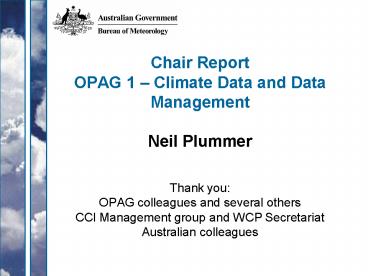Chair Report OPAG 1 - PowerPoint PPT Presentation
1 / 14
Title:
Chair Report OPAG 1
Description:
Stronger and more coordinated linkages with GEO, GCOS, CBS, CIMO, JCOMM, etc activities ... Strengthening links with CBS, JCOMM, GCOS, CIMO, GEO, etc ... – PowerPoint PPT presentation
Number of Views:26
Avg rating:3.0/5.0
Title: Chair Report OPAG 1
1
Chair ReportOPAG 1 Climate Data and Data
ManagementNeil PlummerThank you OPAG
colleagues and several othersCCl Management
group and WCP SecretariatAustralian colleagues
2
Acknowledgment
- The inaugural OPAG 1 Chair - Richard Masikas
contribution to national (Kenya) and
international climate activities over many years.
3
OPAG 1
- Implementation Coordination Team
- Some useful contributions but did not function as
planned - Expert Teams on
- Observing Requirements and Standards for Climate
- Rescue, Preservation and Digitization of Climate
Records - Metadata for Climate Applications
- National Networks and Observations in Support of
Climate Activities - Rapporteurs on
- Regional Aspects of Data and Data Management
- Use of Data from Remote Sensing Systems
- Activities and outputs
- http//www.bom.gov.au/wmo/climate/ccl/opag1.shtml
4
Supporting good quality, consistent and
homogeneous observations
- Key outputs
- Guidelines on
- Climate observation networks and systems
- Phenological observations (outside OPAG)
- Automated versus manual surface meteorological
observations decision factors - Managing changes in observation programs
- Calculating normals (an update, OPAGs 1 2)
5
Supporting good quality, consistent and
homogeneous observations
- Key outputs
- Brief guidelines on data accessibility and
maintaining national climate networks - Inputs to
- The Guide
- CBS led Statements of Guidance (on future
observation systems) - GCOS related activities (e.g. Adequacy report,
implementation plan)
6
Supporting good quality, consistent and
homogeneous observations
- Key misses
- From guidelines to knowledge
- Stronger and more coordinated linkages with GEO,
GCOS, CBS, CIMO, JCOMM, etc activities
7
Improving the capacity to manage climate data
- Key outputs
- Actively supporting Climate Database Management
System (CDMS) project - Support for data management training
- Guidelines on
- Climate data management
- Metadata and homogeneity (with OPAG 2)
- Extensible Markup Language (XML) essentials for
climatologists - Quality control/Quality assurance of climate data
8
Improving the capacity to manage climate data
- Key outputs
- Engagement with the (Future) WMO Information
System (WIS), including on metadata - Key misses
- National and regional opportunities for capturing
resources - International standards for exchanging (station)
metadata
9
Saving national heritage climate data rescue
- Key outputs
- Involvement in data rescue activities, including
through Regional GCOS initiatives - Guidelines on climate data rescue (with OPAG 2)
- Brochure for awareness raising
- Support for training
10
Saving national heritage climate data rescue
- Key misses
- Progress with inventories of available climate
records - Strategy document focussed on planning,
developing and implementing data rescue
activities - National and regional opportunities for capturing
resources
11
Facilitating and supporting activities
- OPAG 1 web site
- http//www.bom.gov.au/wmo/climate/ccl/opag1.shtml
- Training
- Reviewing
- GCOS
- Steering committee, Panels, Regional initiatives
- Regional Climate Centres
- Profile raising
- Presentations at conferences/workshops
- Side events at UNFCCC COP
12
Meeting the challenges 2006-2009
- Making implementation and coordination work more
effectively (CDMSs, data rescue) - Guidelines Knowledge
Adoption - Pathway for Quality Management Framework/Developme
nt of competencies? - Strengthening links with CBS, JCOMM, GCOS, CIMO,
GEO, etc - Managing remotely sensed data and new climate
data - Managing the automation of observations
- Implementing better quality management
13
Quality management metadata
14
Thank Youand thanks to my colleagues































